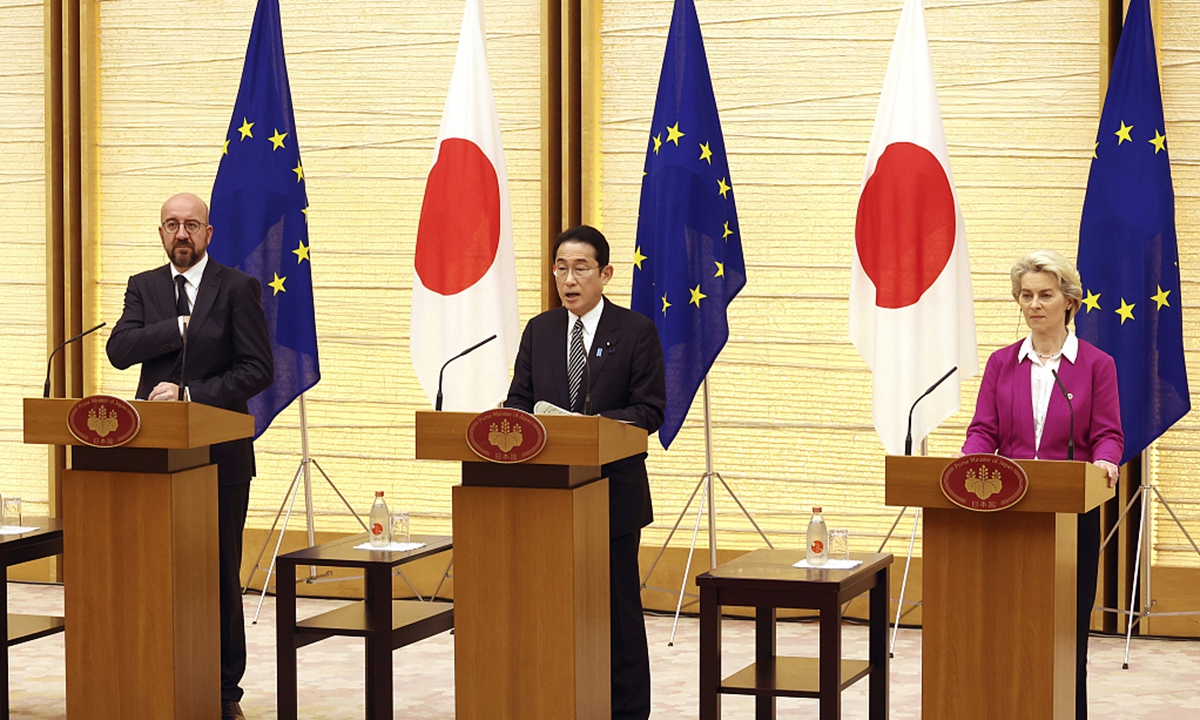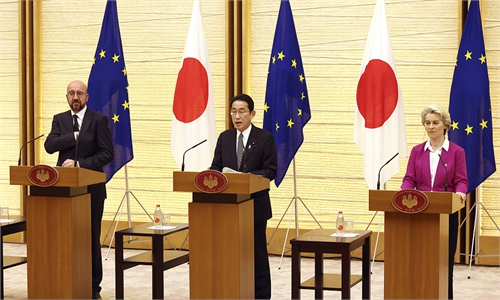
From right, European Commission President Ursula von der Leyen, Japanese Prime Minister Fumio Kishida and European Council President Charles Michel announce their joint statement at the prime minister's official residence in Tokyo on May 12, 2022. Photo: VCG
Japanese Prime Minister Fumio Kishida, European Council President Charles Michel and European Commission President Ursula von der Leyen held the 28th EU-Japan summit in Tokyo on Thursday. The joint statement after the summit covers a wide range of issues from economy and trade to security, from the Russia-Ukraine conflict to China-related issues. It not only shows Japan's and the EU's strategic ambition to lead international changes, but also reflects the two sides' attempt to intervene in global geopolitical disputes.
As two important forces in the post-WWII international landscape, Japan and the EU have had a long history of interaction, but the two sides' relations have been tepid due to their far distance. In recent years, marked by the Japan-EU Economic Partnership Agreement that came into effect in 2019, the two sides have accelerated their strategic approach and their relationship has extended from economy and trade to political and security fields. In the context of the Russia-Ukraine conflict, this round of Japan-EU interaction has shown three major trends.
First is their ambition of becoming the world's "third pole" driven by strategic autonomy. In recent years, Japan and the EU have positioned their relationship as global partners, claiming to maintain the so-called rules-based international order as democracies and "defenders of liberal values." Judged from this round of interactions, the two sides focused on exaggerating the impact of the Russia-Ukraine conflict and the Indo-Pacific changes on the international order. Their wide cooperation shows their strategic ambition to jointly shape the new international order. This is driven by their consideration to avoid simply relying on US' security commitments, as well as their understanding that they cannot assume global leadership alone and it is necessary to jointly form a "third pole" in addition to China and the US.
Second is the Indo-Pacific strategic focus under the US' baton. The current Russia-Ukraine conflict will not change US' strategic focus on the Indo-Pacific region. Washington's wishful thinking is that after Russia is weakened, it can concentrate on dealing with China. The US also wants to make minimal investment, and thus it is more inclined to push its global allies and partners to the front of containing China. Behind Japan's and the EU's strategic approach, there is US' baton. As the Eastern and Western pillars of US global hegemony, Japan's and Europe's diplomatic actions can hardly deviate from the track set by the US. Their strategic approach can reduce US' burden, as well as fill the power vacuum brought about by US' strategic contraction, maintaining the dominance of the Western camp.
Europe recognizes that the Indo-Pacific is becoming the world's economic and geopolitical center, and its future global role depends largely on its influence in the region. The EU must actively participate in the great power game in the region, otherwise it will be marginalized. The EU has chosen Japan due to their similar ideology, as well as Japan's strong economic strength and military security potential. Jointly maintaining the security of the Indo-Pacific sea lanes and the balance of power have become the two strategic goals of Japan and the EU.
The third trend is jointly containing China in the name of maintaining "international order." Despite geopolitical crises, the EU has not relaxed its attention to China. This joint statement blatantly interfered in China's internal affairs, sending a very provocative signal. In the future, Japan-EU security cooperation will still mainly target China.
Japan dominates over the EU in the two sides' focus on China. Japan and the EU have different security concerns about China. In fact, Japan has positioned China as a major threat, but there is no conflict of geopolitical interests between China and the EU. The EU will not easily take risks on the East China Sea, South China Sea and the Taiwan Straits.
Japan's active promotion of military and security cooperation with the EU not only aims at pressuring Russia, but also bypassing domestic public opinion and legal constraints to break through the military restraints after World War II.
After WWII, Japan and Europe focused on economic development, exercised restraint in military security, promoted economic globalization and benefited from the world's peace dividend.

From right, European Commission President Ursula von der Leyen, Japanese Prime Minister Fumio Kishida and European Council President Charles Michel announce their joint statement at the prime minister's official residence in Tokyo on May 12, 2022. Photo: VCG
The author is a research fellow at the China Institute of International Studies. opinion@globaltimes.com.cn

